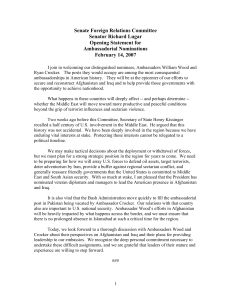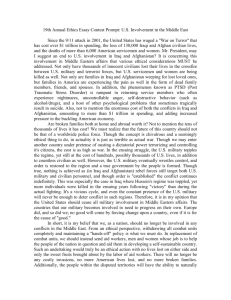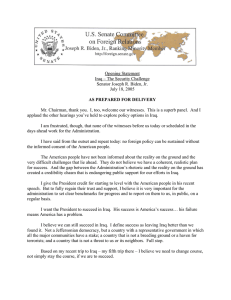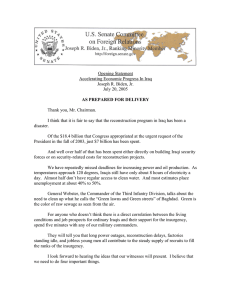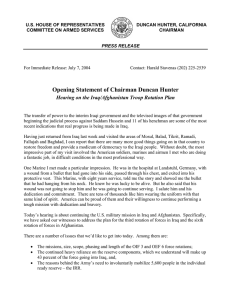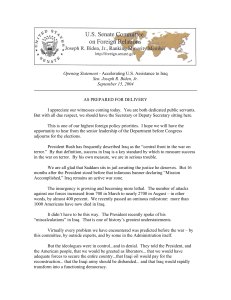Nomination hearing: Zalmay Khalilzad to be Ambassador to Iraq Opening Statement
advertisement
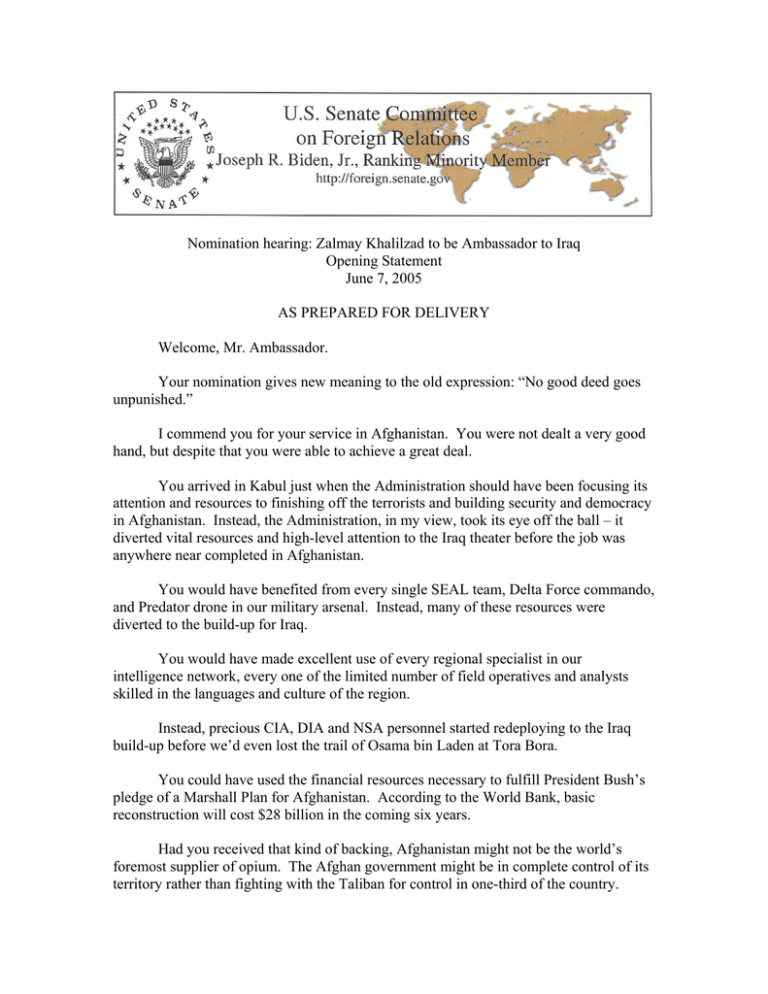
Nomination hearing: Zalmay Khalilzad to be Ambassador to Iraq Opening Statement June 7, 2005 AS PREPARED FOR DELIVERY Welcome, Mr. Ambassador. Your nomination gives new meaning to the old expression: “No good deed goes unpunished.” I commend you for your service in Afghanistan. You were not dealt a very good hand, but despite that you were able to achieve a great deal. You arrived in Kabul just when the Administration should have been focusing its attention and resources to finishing off the terrorists and building security and democracy in Afghanistan. Instead, the Administration, in my view, took its eye off the ball – it diverted vital resources and high-level attention to the Iraq theater before the job was anywhere near completed in Afghanistan. You would have benefited from every single SEAL team, Delta Force commando, and Predator drone in our military arsenal. Instead, many of these resources were diverted to the build-up for Iraq. You would have made excellent use of every regional specialist in our intelligence network, every one of the limited number of field operatives and analysts skilled in the languages and culture of the region. Instead, precious CIA, DIA and NSA personnel started redeploying to the Iraq build-up before we’d even lost the trail of Osama bin Laden at Tora Bora. You could have used the financial resources necessary to fulfill President Bush’s pledge of a Marshall Plan for Afghanistan. According to the World Bank, basic reconstruction will cost $28 billion in the coming six years. Had you received that kind of backing, Afghanistan might not be the world’s foremost supplier of opium. The Afghan government might be in complete control of its territory rather than fighting with the Taliban for control in one-third of the country. 2 I think we can still succeed in Afghanistan, but we could have enhanced our chances for success had the Administration not taken its eye off the ball. Mr. Ambassador, I just returned from my fifth trip to Iraq – and fourth trip since Saddam’s statue fell. For all the obvious differences, the central challenges in Iraq and Afghanistan are very much the same. We must help the Iraqis build a government that is seen as legitimate by the country’s main groups, and has the capacity to defeat the insurgents, provide law and order, defend the borders, and deliver basic services. Until an Iraqi government can do these fundamental things, we will not be able to responsibly draw down our forces. To succeed, I believe there are five areas in which we must focus our attention. First, we must build independent Iraqi security forces. General Petraeus is doing a first-rate job and we now have a good training program in place. But the Administration wasted over 15 months before it got serious about training. And some senior officials continue to exaggerate the capability of Iraq’s security forces. That only feeds cynicism and distrust. We have to be realistic about how quickly Iraqi security forces can be trained to the only standard that counts – the ability to take over from American forces. Right now, only 3 of 107 army battalions are fully capable of operating independently. Many other battalions can operate with strong U.S. backing or to support U.S. operations. But in order for us to leave Iraq, it’s the ability to operate independently that matters. In my judgment, we are at least two years away from that point. And it will take even longer than that if the Iraqis go overboard with deBaathification or fail to take advantage of the many offers of support for security training from our allies in NATO and countries like Egypt. Second, to build legitimacy, we must encourage the Iraqi government to more heavily involve Arab Sunnis. The place to start is to bring them in, immediately, to the Constitution-writing process. Third, we must build the Iraqi government’s capacity to do the things that people everywhere expect of their government -- like provide clean water, sewage removal, and electricity. Today, the Iraqi government has limited reach beyond the Green Zone. And since politics abhors a vacuum, insurgents, militias, criminals, and others are filling the breach. 3 Fourth, we should redirect our assistance away from costly, large-scale projects which face long delays due to the lack of security. Instead, we should rely more on local Iraqis who can make rapid improvements in the quality of life. Fifth, I have urged the Administration to more actively involve our allies and the major powers. The Brussels conference later this month is a step in the right direction. I urge the Administration to build on Brussels by creating a contact group that brings in the major European powers, regional allies, NATO, and the UN. A contact group could help expand assistance to build Iraq's security forces… develop Iraq's governing capacity… assist with the drafting of a new Constitution… discourage and delegitimize outside support for the insurgency… and provide international legitimacy during each phase of what will be a difficult political transition. Finally, Mr. Ambassador, the Administration must level with the American people. To date, we have heard rosy scenarios and repeated premature declarations of success. That is not the way to sustain support for what is going to be a drawn-out effort. Many of the most divisive issues are yet to come, including drafting the Constitution, defining the role of Islam, and deciding the status of Kirkuk The misleading statements which continue to come from the Administration – whether they concern the number of Iraqi security forces trained or the status of the insurgency – make it much more difficult to maintain the support of the American people. So, I implore you – level with us, level with the American people. They will support this critical enterprise, but only if they are told the truth.

